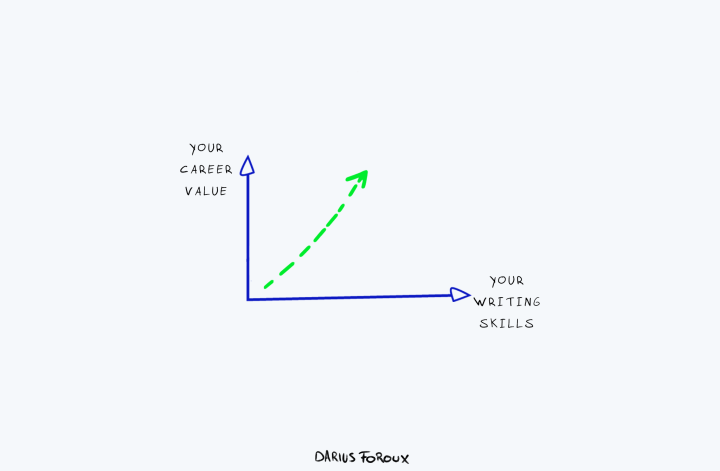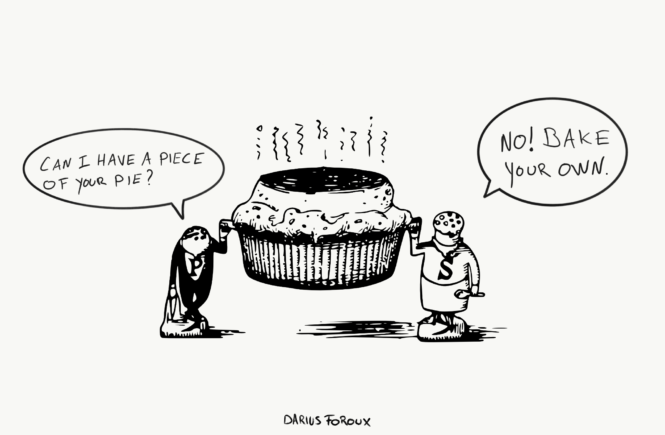I started writing every day in 2015 when I felt stuck in my career. That’s how I discovered the true benefits of writing.
Since then, every area of my life has improved including my finances. I realize you can’t attribute success to a single factor or habit so there’s more to it than writing alone.
But still, I believe that the skill of writing has been the primary reason I got unstuck and built my dream career. And that also came with financial rewards.
The financial benefits of writing are often lost when people talk about writing. They think it’s only for professional writers.
Or these days people think that writing is obsolete. “Who cares about writing if AI can do it for you?” As if writing is the same thing as vacuuming your house.
Sure, a robot can clean your floor and keep your house free of dust. But AI can’t improve your mind when it does your writing for you.
When you write more, you improve your mind. And when you improve your mind, you can achieve your goals, especially the financial ones. Here are 5 benefits of writing that lead to financial success.
1. You will make fewer career and money mistakes
One of my favorite books on journaling and thinking is The Road Less Stupid by Keith J. Cunningham. It’s technically a business book but the main message is about the power of thinking on paper.
Cunningham calls any financial mistake a “dumb tax.” You pay that tax if you don’t take enough time to think your decisions through.
That’s why Cunningham schedules 30 to 45-minute blocks of “Thinking Time,” when he takes the time to think on paper. He asks himself a question and then writes out his answer on paper. He says:
“I start by preparing a high-value question before the actual session begins. The better the question, the more insightful and robust the answers and possibilities created.”
One of his favorite questions is “What Don’t I See?”
I love that question because it forces you to think about the things you usually don’t think about at all. Sometimes people say stuff like, “You don’t know what you don’t know.”
That’s not entirely true. You can certainly take more time to think about your decisions, particularly the ones that impact your finances.
If you make fewer money and career mistakes, you will inevitably become wealthier because you lose less money.
2. When you write something down, you’re more likely to stick to it
This is one of those things you can only experience when you do it consistently.
We all have ideas and goals in our minds. And most of us just keep on living on year in and year out without ever realizing those goals.
The goals and ideas just live somewhere in their minds. They never start because it’s impossible to execute abstract ideas. You must grab your ideas and write them down in a very detailed way.
- What do you want to do?
- Why do you want to do it?
- How are you going to do it?
- When are you starting?
It’s also harder to back away from a written goal than one just stored in your mind. When you make your goals specific, you will not only feel more attached to them, but you will also have more clarity.
All these things together will make it more likely to stick to the things you write down.
3. Writing leads to better recall of information
We all know about this benefit from our school days. When we were in class and took extensive notes we remembered the information much better. Especially when we write on paper.
A 2021 study showed that writing on paper can lead to more brain activity when remembering the information an hour later.
The researchers said that the unique, complex, spatial, and tactile information associated with writing by hand on physical paper is likely what leads to improved memory.1Source: Science Daily
When something is written down on paper, it’s easier to remember and visualize than when you rely on your memory alone.
Take your journal everywhere you go!
4. Keeping track of your spending habits helps you to save more money
How much money did you spend today? You can probably answer that question.
But how about the amount you spent over the past week? Or, one step farther, the past month?
Most of us have no clue.
As someone with a relatively good memory and a high awareness of my spending habits, I’m clueless about how much money I’ve spent unless I look into it regularly.
This is a lot simpler than it sounds. Simply sit down with your journal and open your bank account statement on your computer or mobile app.
Look at the unusual expenditures and write them down. Write down the amount, what you spent it on, and why.
No need to write about your fixed costs or groceries. Look at the odd expenditures that are not in line with your normal behavior.
This activity makes you more aware of how you spend your money in the future. Never blame yourself for the money you spent in the past. That’s done.
Simply learn from it and use your insights in the future.
5. Writing opens doors to new career opportunities
In my experience, people with good writing skills are more disciplined, thoughtful, and logical thinkers.
All these traits will help you to get better at your job.
And it doesn’t matter whether you’re a designer, customer support agent, project manager, or health care worker.
Nearly every job in today’s economy requires you to write almost daily, whether it’s emails, reports, or instructions for your team members.
The better you get at writing, the better you get at other areas of your career. That’s why you usually get new opportunities when you start to improve your writing.
I’ve not only seen it in my own career, but also with my family, team members, and the thousands of students who took my writing course.
Writing is one of the most valuable skills in the world simply because it makes YOU more valuable.




